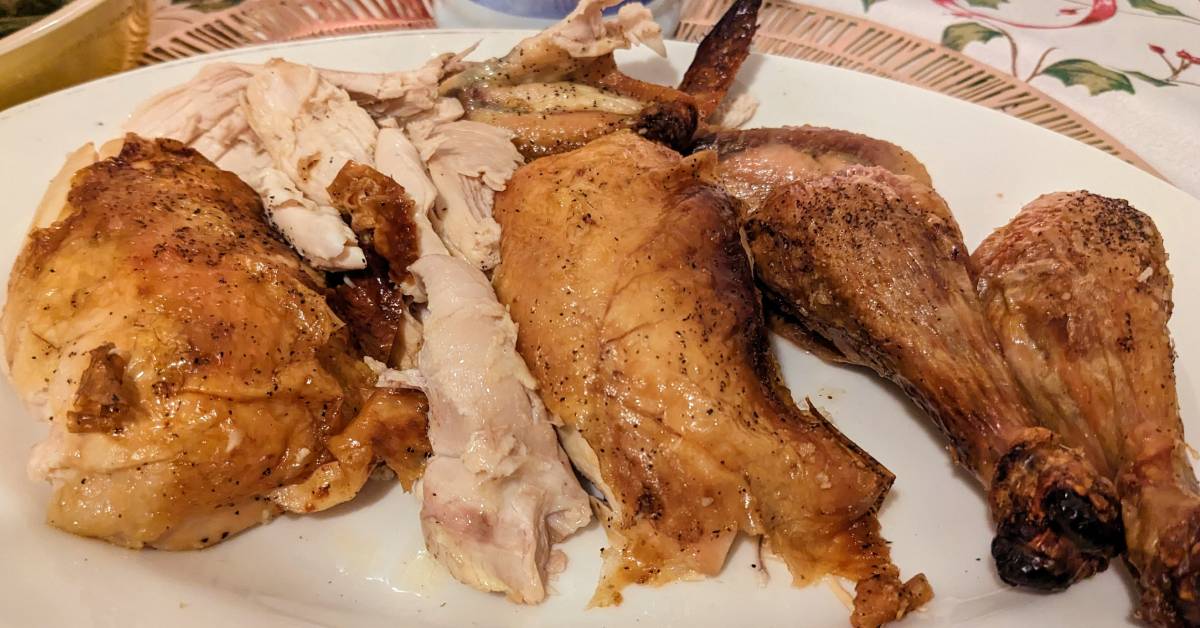Note: This post was updated in January, 2023.
White meat versus dark meat! I used to believe white meat was superior, but I’ve come around and like them both about the same now. I just love chicken in general, really.

Here’s the breakdown of the difference between the two.
First, when we’re talking about white versus dark meat we’re primarily referring to chicken and turkey. Ducks we’ll touch upon after.
White Meat: More Nutrient-Rich & Cheaper Than Dark
White meat is found in the breasts and wings of chicken and turkey. These muscles are used for flight – and guess what? Chickens and turkeys don’t fly that much, therefore, these muscles that make up the white meat aren’t as dense. These “fast-twitch” fibers are used for quick bursts of energy, like being startled out of a chicken coop.
The color of the meat comes from a protein called myoglobin. There isn’t that much myoglobin in these lesser-used muscles, and that’s why the color is lighter. More myoglobin = a darker color.
You’ll generally find more calcium, magnesium, potassium, phosphorus, protein, and vitamin B3 (niacin) in white meat than dark. Dark meat has more calories, cholesterol, and sodium, although not that much more.
Best cooking methods for white meat include pan frying, stir frying, broiling, grilling, and other fast methods of cooking (have you ever had too-dry chicken breasts come out of the oven?). That’s not to say you can’t roast white meat, but there is a higher danger of the meal drying out.
Historically, white meat has been less expensive than dark. This reportedly in part has to do with the process of removing the chicken bone and skin from the dark meat; there was also that chicken wing shortage in 2021.
Dark Meat: More Flavorful & Fatty Than White
Dark meat refers to the thighs and drumsticks of the birds. These muscles are used for walking, which these animals do a lot of – certainly more than flying. Consequently, dark meat is denser and arguably more flavorful.
The dark meat muscle gets its energy primarily from fat instead of glycogen, for a more prolonged, slow release type of energy. These are the “slow-twitch” fibers. The darker color of the meat comes from being rich in myoglobin.
Although white meat is widely considered a better choice health-wise than dark, dark meat is higher in iron, thiamine, riboflavin, vitamin B6, vitamin B12, and zinc than white meat; it also boasts omega-3 fatty acids, the healthy fats.
Dark meat can be roasted, braised, pan fried, or whatever you wish, really – it’s tough to overcook (no pun intended).
A Word on Duck Meat & Red Meat & That Other White Meat
By now, you may have guessed why duck meat is different, even though its fowl just like chicken and turkey. Because ducks do in fact fly a lot, their breasts and wings are predominantly dark meat; white meat is found in the legs, if it’s present at all. Duck meat is still generally not as dark as beef or lamb, though.
Technically, chicken, turkey, and duck meat is all grouped together as “white meat” when compared to meat that comes from four-legged livestock, which is classified as red meat. (Yes, pork is a red meat, even though it’s sometimes called “the other white meat.”
Although white meat is generally considered healthier than dark, they’re both understood to be better for you than red meat.
Find out the difference between mayonnaise and aioli >>
Sources:
- Canadian Chicken: White Meat vs. Dark Meat: The Great Debate
- Carnivore Style: Dark Meat vs White Meat (Which Is Better for You?)
- Healthline: Is Duck Considered Red Meat?
- Jessica Gavin: White Meat vs. Dark Meat
- The Kitchn: Food Science: The Difference Between White Meat and Dark Meat
- Lacademie: White Meat Vs Dark Meat Chicken – The Best Comparison 2023
- MasterClass: White Meat vs. Dark Meat Chicken: What’s the Real Difference?
- The New York Times: The Claim: White Meat Is Healthier Than Dark Meat
- WiseGeek: What is the Difference Between White Meat and Dark Meat?